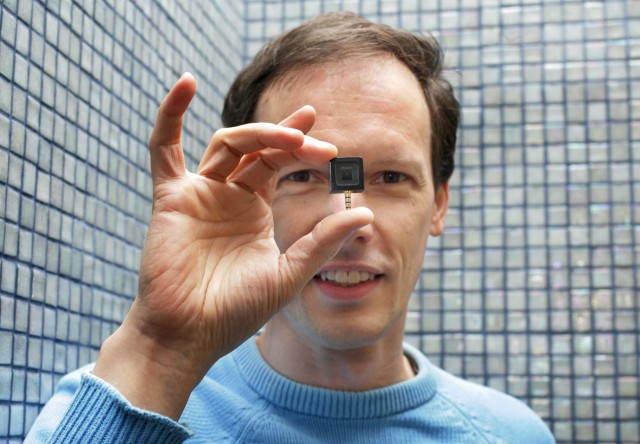
McKelvey — one-time employer and longtime friend of Dorsey, a
“I said to Jack, we should solve this problem,”
McKelvey said. “It began with a lost sale and the frustration of a
small merchant.”
Nine months later, the two partners revealed their
proposed solution to a tech community thirsting to know the next move
by the man whose microblogging service, Twitter, changed the way people
connect and share information.
At its heart, Square is rather simple. It’s a small
plastic device, or dongle, that plugs into a cell phone’s audio jack
and allows anyone, including small merchants and individuals, to accept
credit card payments. The credit card owner uses a finger to sign a
receipt on the phone’s touch screen.
In some ways, it’s a pronounced change from the
status quo that requires every business that accepts credit cards to
have its own merchant account — a type of bank account used to process
payments. Often, small-business owners don’t have them because they’re
expensive.
But now Square says smaller businesses and
individuals will be able to piggyback on its merchant account, opening
the world of credit card sales to people and businesses locked out by
current restrictions.
The idea of such a thing has left many in the
financial services sector scratching their heads — and in some cases,
rolling their eyes — at Dorsey’s upstart company, which will have
offices in
They also want to know how much it will cost to use
the service. It’s expected that each transaction will include some sort
of fee to pay for Square’s operations, as well as the fee — typically 2
percent to 3 percent — charged credit card companies.
The uncertainties surrounding Square have left analysts like
“It’s largely just hype at this point,” McPherson said. “I wouldn’t put too much stock in it.”
Not everyone agrees, however. Square’s first round of venture capital funding valued the company at
Some of the mystery surrounding Square can be traced
to Dorsey and the way Twitter has grown. Much of that company’s success
— there’s even talk now that it will be profitable this year after
signing search deals with
Consider the recent addition of a “retweet button”
allowing users to quickly rebroadcast other users’ updates. It simply
made it easier for people to do something they were already doing.
McKelvey suggests a similar path for Square, now in early testing with some 300 merchants in
“We don’t know where this is going. If done right, the market will tell us what the uses are,” he said.
For now, the company expects to go after businesses
not big enough to have their own merchant accounts. That means they
don’t expect to take much business from competitors. But McKelvey said
they’ve had inquiries from clothing retailers interested in a system
that would let employees do checkouts anywhere in a store.
There’s also the possibility Square could prove popular for transactions between people making deals on
Still months away from an expected launch during the
first quarter of 2010, the company already has its share of critics.
Some wonder if there’s a viable market for what Square is offering.
“He’s really going after the bottom-of-the-barrel merchants,” said
Kleitsch and others have been quick to point out
that Square offers little that’s new. Several companies already have
mobile payment systems, some using specialized devices and others using
cell phones. The key difference is that everyone else requires a
merchant account.
That includes a new mobile device expected to hit
the market just ahead of Square. PAYware Mobile also uses a card reader
that attaches to a cell phone and targets lower-volume businesses. A
key difference is that PAYware is made by
“We’re pretty much ready to go to market,” Rasori said. “This is the real deal.”
That Square already has a strong competitor
illustrates one potential problem for the young company. If successful,
it’s going to be vulnerable to competition, said Sherif Nasser,
assistant professor of marketing at
The thing that makes PayPal, an online payment
system, successful has been its ability to create a large base of
connected users — you can only do business through PayPal if both of
you have an account.
But Square won’t have that same captive audience,
Nasser said. Credit card users aren’t obligated to use any particular
payment system. There’s nothing stopping a larger company from creating
serious problems for Square.
“If I were Apple or
And, as it turns out, it wouldn’t be all that hard
for someone to build a system remarkably similar to Square. That’s
because the man who helped create the card reader had a falling out
with Dorsey and McKelvey.
worked with the pair earlier this year and has applied for a patent on
the device. But after months of negotiations over compensation failed,
they basically agreed to go their separate ways, with Square saying it
would use something different for card reading.
The professor says he has no ill feelings toward
Square: “I just want to get my story out there. It’s actually my idea
and it’s for sale.”
—
(c) 2009, St. Louis Post-Dispatch.
Visit the
Distributed by McClatchy-Tribune Information Services.















































